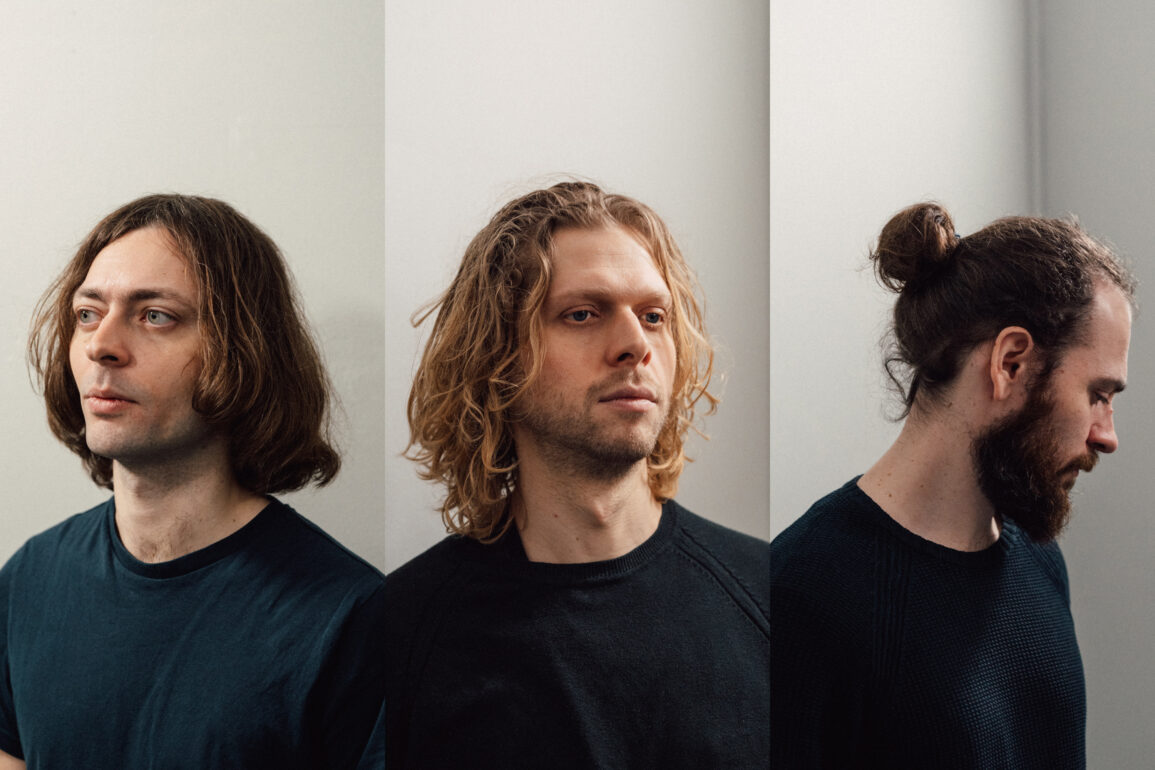Cover Photo Credit: Sorrel Higgins
Performing recently at the 30th Istanbul Jazz Festival, British band Mammal Hands also released their fifth album Gift from the Trees earlier this year. We talked to saxophonist Jordan Smart and drummer Jesse Barrett to catch up and see what is going on.
Nice to meet you on Zoom. I was at your recent Istanbul concert, too. How are you? How is the tour going?
Jordan Smart: We are at home. The tour has been going well. We have done maybe 20 shows so far supporting the album. Quite a range of venues and festivals and stuff, some especially special. We have done a couple of philharmonics. All really good.
Do you have favorite memories from your times in Istanbul?
Jordan: I think we just like the evening/night vibe there, where you just get a few cups of tea and hang out. It’s all very chill.
The first time I saw you was at Salon, which is an indoor venue. Now, a few days ago, you played an open-air gig at Istanbul Jazz Festival. You also mentioned some philharmonic concerts just now. All very different vibes. Do you have a favorite vibe for concerts?
Jesse Barrett: It’s all very different. When you play on a big festival stage, it’s wide open. Then you have the opportunity to look out at a big scene and lots of people. You got all those different smells in the air. Playing outdoors is much more chaotic. You never really know what is going to happen. Performing at a nice venue like Salon or with a philharmonic orchestra, you get a much more controlled environment. Although, sometimes, that can be chaotic as well. We have had some really nice outdoor experiences too, sometimes nature can just come in and intervene and change things. That can be interesting.
Your new album, Gift from the Trees, is out for a while now. Let’s go through the basics, tell me of its story and how it was created.
Jordan: We have been a band for a really long time. We meet up and play things together. We are all constantly working, writing, and coming up with ideas together or by ourselves. We are developing our personal styles. When we are meeting up, we feel like it is time to write a new album. We collect ideas, jam a lot, and stuff just kind of takes shape. It is initially very nebulous and can be quite a long process. There are periods of intense focus as well as phases where we are unfocused. It reflects how we are feeling, and that happens with every album, so this one came to be in the same way we have always done. We trust that process because it feels quite organic. It has worked for us so far in helping to see things that are contrived or aren’t progressing. That way, we can feel in touch with the moment.
In what ways did working in a residential studio change the way you work for this album? It was a different experience when compared to your previous albums, I assume?
Jesse: Yeah, it was different. There were four of us working in the studio, and when you are all sleeping residentially, it knows no limits as to how a group of four people decides when to start or finish. Everything is an organic negotiation. It means that you are able to access a more natural flow between everyone. It does change the outcome. I think when you are on a notified clock in the studio, your attitude also becomes notified. You have specific aims, you might decide the night before what you want to do the next day. Then you go in and try to do that between the time frame. When you are just flowing day to day, though, you can be more spontaneous. One thing that is really important to us when we write music is spontaneity, I think. The writing process is very spontaneous. Tunes can just come out of nowhere at any point, really. Or a tune’s beginning might just happen in the middle of working on another stuff. Some of those end up being really important pieces. So it’s beautiful to get more access to that spontaneous aspect of what we do. Being in a residential studio definitely helped us achieve that.
If you were to pick the easiest and hardest songs to create from the new album, what would those be?
Jordan: I guess the hardest ones would probably have to be those we spent more time writing, and to a further extent, the ones that were hardest to get a good take of, a take we were happy with. I think it would have to be one of the more complex tunes, like “Labyrinth.” And then conversely, the easiest would be something that happened in just one take, so maybe “Sleeping Bear.” That just came to be, and we barely had to do anything to it.
Jesse: Yeah, that was definitely easy. I mean, to me, they are all the same. If you are working in a more stripped-back, simple setting musically, playing simple is just as hard, if not more difficult than, playing more complex tunes. Just from a drumming point of view, anyway. I suppose the difficulty aspect comes when there is more labor involved. But the skill level is the same for all songs, in my opinion. There are times when all your energy and skills seem to be at your fingertips and everyone is in a really good place with the tunes just flowing out really well. You could just say that it is easy, but it actually means everyone is vibing on a good level. And then there are times when you have to push beyond what is immediately there for you, and you work and work until you reach a common goal with something. I can’t remember which ones were hard and which ones were easy, but the challenges are all the same. Some things just take longer than others.
Your albums are often influenced by nature. There is a prominent forest theme in this one as well. My question is: Do you have any songs from your catalog that, in your mind, are strongly associated with a certain place?
Jesse: Not necessarily a place, but more like aspects of nature. In particular, the different movements and attitudes of animals. That is something I use quite a lot to access specific types of approaches in my plane. So yeah, kind of. Not so much locations, though.
Jordan: I think in terms of place, though probably not often, ideas can come from somewhere it was written or be associated with a journey. We do a lot of the work in one place, but sometimes the ideas come from other places. I have a bunch of notebooks where I am drawing things down, and occasionally there are things that I throw into a tune. Places that I had in my head for a while. Those tunes may be associated with certain places.
But I think I agree more with Jesse. Because songs are living things. The ones we perform regularly are the ones with the strongest ongoing life. They have an emotional charge, a feeling associated with them, which you try to embody every time you play them. They can be quite complex, multilayered things. “Archetypal” would probably be an easier description. I think with each song you have a place in your mind, which you need access to play right the way it feels right. And that is constantly evolving. Every time you visit that place, it shifts slightly with a new plane and new feeling you bring to the tune.
Jesse: I find what Jordan just talked about very interesting because we don’t really talk about this. (all laugh) I am sure we all do it in slightly different ways, but for me, it is not something intentional. It just started happening because it was a way of protecting the movement in the piece if that makes sense. You can inhabit the right attitude and sense, like if you are a hunter-gatherer. You know, getting into the mind of the animal to hunt it. I feel, at least for me, that it is similar to that. Feels like part of an improvisatory process where you can honor the song, but also keep it moving and changing at the same time by fully inhabiting aspects rather than playing the exact same things.
The new album is described both as wintery and springy in your press release. Could you define each of your albums as seasons?
Jordan: That’s quite a good question! I think we would have to break it down to the track level, especially with this album. Some of the earlier albums were done in a single recording session. I can say that the vibe and the time affected how we made the recording the way it was at that time of the year. Some of the songs just reflected the bleakness of Manchester, you know. (laughs) Got memories of us wandering around after the sessions in the rain.
For the newer ones though, considering it track by track could be more appropriate. I think the reason why the press release mentions those two sessions is because we did two recording sessions. One was deep in winter when it was very cold and icy, and the other one was towards the end of spring. So it was super nice, we were going on long walks. Those two times are not that far apart chronologically, but they also feel like they are two very different points of the year in a way. The new life of spring is an entirely different vibe than the dead of winter. That, I guess, came through different ways in the album.
The summer in Britain is a lot rainier than the summer in Turkey, so I guess the climate aspect changes a lot in perspective.
Jordan: Yeah. We just had a crazy storm over here.

What are the last three songs on your streaming platform’s search history?
Jordan: I must have been in a hip-hop mood. I got “The Star Room (OG Version)” by Mac Miller and Earl Sweatshirt, it has a sample of “Cuckoo” by Benjamin Britten. Then there is “Guv’nor” by JJ Doom. Finally, there is “Seven Yellow Gypsies” by Jon Boden. He is an English artist who, early on in his career, did folk songs every month. Those were later put into collections. He did lots of unaccompanied versions of British folk songs. They are pretty. I think most people these days refer to “Seven Yellow Gypsies” as “Raggle Taggle Gypsy.” There are lots of different versions with different lyrics.
Jesse: I don’t exactly know how to check out the most recent songs, so I will just tell you some stuff I see here. Let’s see. Oh, god, I am never really good at finding things. (all laugh) I listened to “Storms in Africa” by Enya.
I love the Enya revival that is going on among music circles recently.
Jesse: Is there an Enya revival going on? I did not know that! I think Enya is an unfairly misunderstood artist. That tune “Storms in Africa” actually has one of the heaviest techno synth builds. It’s pretty bananas. Obviously, it goes to a bit more folky place after that, but there is some really excellent synthesizer work there. I think she was going through some really deep sound world in her music. I don’t know if all of her discography is the stuff that I want to listen to, but some of it is really interesting.
I also listened to the album Innovation by Vijay Kumar Sant, the sitar player. It was actually my teacher playing with him in that album. It was recorded in London in 1991. We listened to it together with Jordan, actually.
Songs are living things. The ones we perform regularly are the ones with the strongest ongoing life. They have an emotional charge, a feeling associated with them, which you try to embody every time you play them.
Jordan Smart
Have you ever considered an album of remixes done by other artists?
Jordan: There have been various chats about that with the label at different points. Like remixing each other’s tunes or doing covers of each other’s tunes. We have a few joke covers of other people’s music that we do regularly, but those will never see the light of day. Ever. (all laugh)
That’s sad.
Jordan: Because the way we work together isn’t particularly electronic. So it would not necessarily be that much in keeping with our music. GoGo Penguin made a really interesting remix album recently, and I think such a move makes more sense with them. The way they write songs is much more influenced by electronic music. More easily samplable and all. The main thing with us stopping that is we don’t record or work with a grade ever. (laughs) The tunes will be very variable in tempo, extremely dynamic… And all the bass is coming from the drums, so it would probably be a tricky job to remix. Not that it might not be interesting, but it feels quite distant from the way we work.
Jesse: I think we are extremely idiosyncratic. We are a very bandy band, we have our own world that we work in. It never really felt possible to do stuff like that. Also, with our tunes, if anyone’s gonna do a remix, it will be us! (all laughs) We have definitely had conversations about remixing certain tunes to focus on different aspects. You can highlight a whole different area of a tune by doing that. That would definitely be interesting, but there are also always new tunes incoming, so it is not always easy to find space for that.
You can check out Mammal Hands’ official site here and Bandcamp profile here.



